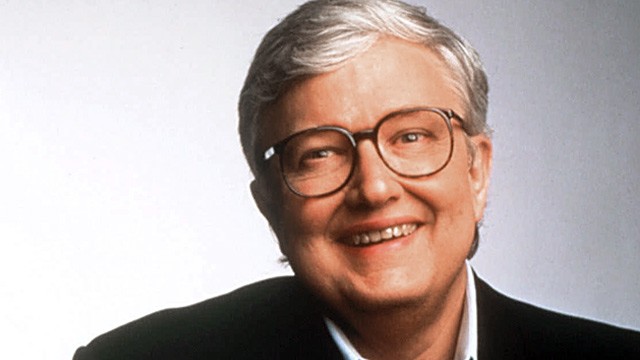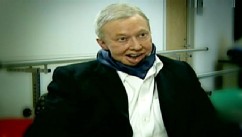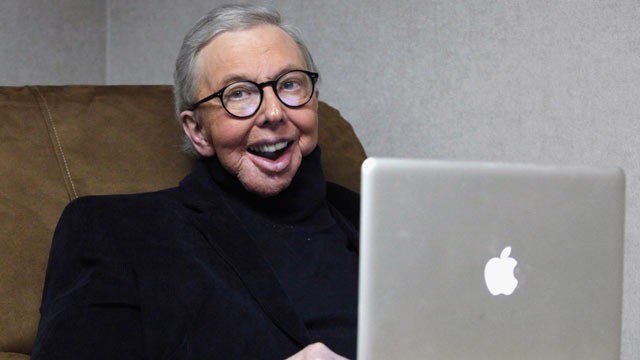make him a "role model" for other patients.
By showing the ups and downs of cancer over the last decade, Ebert, who died on April 4th, illustrated that cancer patients can continue with life, even if that life is forever changed, said Dr. Michael Neuss, chief medical officer at Vanderbilt-Ingram Cancer Center, who was not involved with Ebert's care.
"I think he broadened our understanding of cancer based on his incredible courage and incredible strength and genuine demeanor through this tough time," Neuss said. "It has to show people that we do treat cancer patients and that things do happen, but you keep going."
PHOTOS: Roger Ebert Through the Years
Ebert, 70, revealed in Tuesday's blog that the "painful" hip fracture he sustained in December was actually caused by cancer, so he planned to undergo radiation and limit the number of movies he reviewed in the future.
He said he wrote the most movie reviews of his career in 2012 – 306 of them – and would continue to work on his ongoing projects, such as his new website, Ebert Digital, and a potential fourth book of classic movie reviews.
"It really stinks that the cancer has returned and that I have spent too many days in the hospital," he wrote. "So on bad days I may write about the vulnerability that accompanies illness. On good days, I may wax ecstatic about a movie so good it transports me beyond illness."
Buena Vista Television/AP Photo
Film critic Roger Ebert is shown in a 1994... View Full Size
Roger Ebert Dead at 70 Watch Video
Roger Ebert Defends 'Star Wars' in 1983 Watch Video
Roger Ebert's Cancer Return Spurs 'Leave of Presence' Watch Video
Ebert was first diagnosed with thyroid cancer in 2002 and then with recurring salivary gland growths a year later. In 2006, he lost his ability to speak because of the cancer and reconstructive surgery complications. Through all this, he was open with his readers.
FULL COVERAGE: Roger Ebert
In 2010, Ebert allowed Esquire magazine to publish an intimate profile of him complete with a full-page photograph of his face, his jaw visibly altered.
"When I turned to it in the magazine, I got a jolt from the full-page photograph of my jaw drooping," he wrote in a blog at the time. "Not a lovely sight. But then I am not a lovely sight, and in a moment I thought, Well, what the hell. It's just as well it's out there. That's how I look, after all."
Ebert's frankness – much like Kylie Minogue's openness with breast cancer – raises public awareness, which helps increase screening rates and decrease stigma, said Tenbroeck Smith, who directs patient-reported outcome research at the American Cancer Society.
PHOTOS: 2013 in Memoriam
Half a century ago, when cancer was considered a death sentence, people often kept their diagnoses from employers, friends and even family members, which has been shown to have adverse effects on health outcomes, Smith said.
A recent American Cancer Society study found that 80 percent of cancer survivors in a survey said they got support from their employers during their illnesses.
Last April, Ebert gave a 20-minute TED Talk – via a computer voice program and help from his wife and friends who read portions of the speech aloud for him – about finding his voice after his jaw deformity rendered it powerless. He discussed the surgeries, voice software and how people acted around him.
"It is human nature to look away from illness," said Ebert's wife, Chaz, reading his words on paper as he held her hand and nodded. "My ability to think and write have not been affected. And on the Web, my real voice finds expression."
Charles Rex Arbogast/AP Photo
In this Jan. 12, 2011 file photo, Pulitzer... View Full Size
Roger Ebert Dead at 70 Watch Video
Neuss said that as a physician, it took him a long time to learn how to look disfigured patients in the eye. He said people tend to look away because they think it's polite, but that's not the case.
"I think they like to be seen as the people they are inside the face of illness," Neuss said. "I think him [Ebert] helping us do that is important."

















আমাদের পরিষেবাগুলি বিতরণে কুকিজ সহায়তা করে৷ আমাদের পরিষেবা ব্যবহার করে, আপনি আমাদের কুকিজ ব্যবহারের সাথে সম্মত হন৷
ReplyDelete